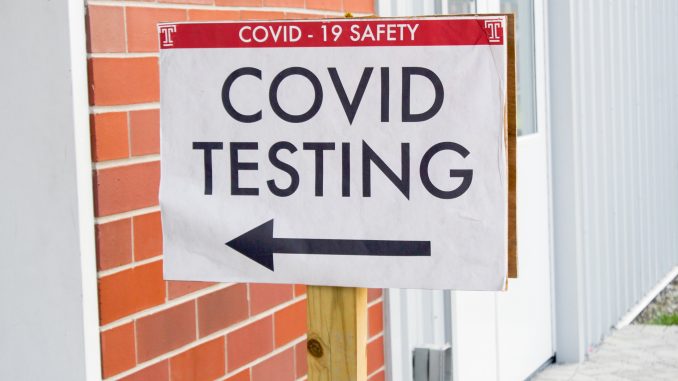
Temple University, while awaiting rapid COVID-19 test kits, moved all testing from the Aramark Student Training and Recreation Complex to the Student Health Services testing center on Cecil B. Moore Avenue, wrote Ray Betzner, a spokesperson for the university, in an email to The Temple News.
Temple will continue to test students for the remainder of the semester, but the university does not have plans to test community residents at the Student Health Services testing center, said Mark Denys, director of Student Health Services.
Temple University Hospital is offering testing to community residents at the hospital’s main campus, Episcopal Campus and Jeanes Campus, Denys said.
The university encourages students who have exposure to or display symptoms of COVID-19 to get tested, but, if asymptomatic students disregard Temple’s recommendation that only symptomatic students get tested and sign up online for a test, they will not be turned away, Denys said.
“We’re testing anyone who schedules and shows up,” Denys said. “I will say one caveat to that, if they were tested in the last three days, we won’t test them. And if they had a positive result in the last three months, we won’t test them.”
Temple is testing faculty and staff at Employee Health Services, in the Student Health Services building on Broad Street near Cecil B. Moore Avenue, but because the COVID-19 outbreak impacted mostly students, demand for faculty tests have been low, Denys said.
Temple reported a 4.49 percent positivity rate the week of Sept. 14, down from more than 10 percent two weeks before, according to the Temple’s COVID-19 dashboard.
“We’re definitely seeing a decrease in our positivity rate, which is a great thing,” Denys said. “That’s where we want things to be heading. So we’re hoping things continue in that same direction, and that we don’t see another spike. But if we do, we’re prepared to take additional actions.”
The university received rapid testing machines a few weeks ago, but is waiting for reagents, the reactive substance in the rapid test kits for the machines, Denys said.
“The plan is dependent on the supply chain, and right now, that supply chain has been interrupted,” Denys said. “Some reagents and other supplies have been reallocated by the government to other areas and other hot spots.”
If the university receives rapid tests, which would report results in around 15 minutes, they would only be used on symptomatic patients because the tests are not as accurate on asymptomatic patients, Denys said.
Rapid tests would allow Temple to more effectively contact trace students and staff, because test results would process quicker, said Abby Rudolph, an associate professor at the College of Public Health.
“The people that should have been notified to quarantine might have already been infected and then spread it to other people,” Rudolph said. “So we’re like two steps behind the game if things are too slow.”
Temple is sending some tests to LabCorp, which returns results in 24 to 36 hours, and some to Temple Hospital, which returns results in 24 to 56 hours, Denys said.
The university hired Kara Reid, a contact tracing manager who trained 11 contact tracers so far, Denys said.
The city has helped Temple conduct contact tracing during the past few weeks, Denys said.
Labs that run tests must report positive cases of Philadelphia residents to the city, said James Garrow, a spokesperson for the Philadelphia Department of Public Health. City case investigators then contact positive residents and determine who they’ve been in contact with.
“Our case investigators will take that information and contact information and share it with the contact tracing team, who will then reach out to those folks and let them know that they may have been exposed,” Garrow said.
The PDPH receives delayed results about Temple students who are not Philadelphia residents, Garrow said.
Students who test positive have the option of quarantining at home or in isolation housing at Johnson and Hardwick Halls for 10 days, Denys said. Of the 450 rooms set aside in Johnson and Hardwick, six were occupied as of Sept. 16.
Students who have been exposed to or display symptoms of COVID-19 should quarantine for 14 days, but students with confirmed positive cases should isolate for 10 days, Garrow said.
“Once someone’s symptoms resolve, they’re no longer feeling sick and it’s been about a week or so, essentially they’re not infectious at that point,” Garrow said. “There’s no need to stay in isolation.”


Be the first to comment